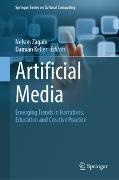Read more
A groundbreaking exploration of the evolving relationship between the fields of artificial intelligence and creativity studies, Artificial Media charts the course of a transformative path toward hybrid methodologies involving computing and human-centric approaches.
Scholars and practitioners from leading research centers in South America, Asia and Europe delve into theoretical and philosophical frameworks, practical deployments and data-based critical analyses of artificial-media initiatives that reconfigure authorship and collaboration. Co-creation, collective memory, and situated-knowledge practices are featured in multiple hands-on examples of technological design, music, visual-arts, journalistic and educational projects that address the ethical and social implications of generative techniques.
Through an interdisciplinary lens, this collection, projects a nuanced panorama of both the remarkable results and the complex challenges of emerging artificial-media methods, offering practical insights for anyone seeking to engage with the future of creativity in the age of autonomous machines.
List of contents
Exploring the frontiers of artificial media.- Part 1: Emergent theoretical perspectives and conceptual frameworks.- Unlocking the black box of artificial media with quantified and explainable co-creative AI systems.- Between Puppet and Actor: Reframing authorship in this age of AI agents.- Do AI Avatars generate our past? Hacking into transformations of temporality by synthetic media.- Cybernetic resurgences: Machine Music beyond AI slop.- Part 2: Artificial media in education and design.- Media education as AI education An experiential approach to integrate generative AI in engineering pedagogy at University.- Design of interactive narratives mediated by artificial media: The use of AI in secondary education.- The use of artificial media as a tool for the creation of artistic images through collaborative methodologies.- Artificial intelligence and the influence of AI filters on creative processes in TikTok: Methodological challenges.- Part 3: Artificial media in practice.- Proposal for using artificial media for reinforcing Journalism: Responsibility, discourse, deliberation, and audiences' participation.- Crafting artificial musicians: Building solaris as a co-pperative, perceiving, and creative AI.- Trás-os-Mundos, Outros Douros: Constructing retrofuturistic narratives through artificial intelligence.
About the author
Nelson Zagalo is full professor of Multimedia at the University of Aveiro, and Scientific Coordinator of DigiMedia - Digital Media and Interaction Research Center. He founded the Portuguese Society for Videogames Sciences, and the Journal of Digital Media & Interaction. He is the author of more than two hundred peer-reviewed publications in journals, books and conferences worldwide. He has written the books "Interactive Emotions” (2009), “Videogames in Portugal” (2013), and "Engagement Design. Designing for Interaction Motivations" (2020).
Damián Keller is a full professor of music technology at the Federal University of Acre and the Federal University of Paraíba in Brazil. He is a founding member of the international research network Ubiquitous Music Group and of the Amazon Center for Music Research (NAP). He has published over two hundred articles on ubiquitous music and ecologically grounded creative practice in journals on computing, engineering, design, education, philosophy and the arts. His latest coedited book is Ubiquitous Music Ecologies (Routledge).
Summary
A groundbreaking exploration of the evolving relationship between the fields of artificial intelligence and creativity studies, Artificial Media charts the course of a transformative path toward hybrid methodologies involving computing and human-centric approaches.
Scholars and practitioners from leading research centers in South America, Asia and Europe delve into theoretical and philosophical frameworks, practical deployments and data-based critical analyses of artificial-media initiatives that reconfigure authorship and collaboration. Co-creation, collective memory, and situated-knowledge practices are featured in multiple hands-on examples of technological design, music, visual-arts, journalistic and educational projects that address the ethical and social implications of generative techniques.
Through an interdisciplinary lens, this collection, projects a nuanced panorama of both the remarkable results and the complex challenges of emerging artificial-media methods, offering practical insights for anyone seeking to engage with the future of creativity in the age of autonomous machines.

